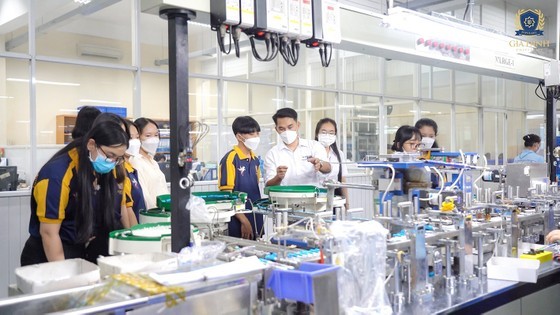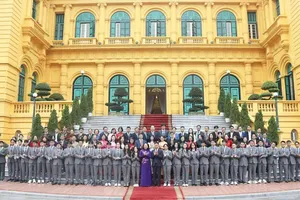
 |
Students of Gia Dinh University in their practical class |
According to educationists, private universities are currently racing to open majors, increasing targets, and not paying attention to revitalizing investment in facilities and improving education quality. An inevitable consequence of the current situation is that students cannot meet the high demands of the high-quality human resources of society.
Many private universities are being managed and operated by corporations and large-scale enterprises earning high revenues, but these schools are still hiring premises as lecture halls.
Typically, Gia Dinh University was established in 2007 but until now the facility is still rented a house at 371 Nguyen Kiem Street in Ward 3 of Ho Chi Minh City Go Vap District and 185-187 Hoang Van Thu Street in Ward 8 of Phu Nhuan District. Meanwhile, construction of Hoa Sen University's main campus in HCMC’s District 1 has been completed, but currently, it still has to rent facilities in District 3 and District 12.
Although Nguyen Tat Thanh University has invested in building many facilities, it still has to rent facilities in many places in District 7 and District 12. Even though it is called an international university, Hong Bang International University still rents premises at 120 Hoa Binh Street in Hoa Thanh Ward of Tan Phu District.
Anonymous Associate Professor disclosed the truth about private-owned schools after 2 years working as principal of a private university in Ho Chi Minh City. He now resigns as principal of that private school. He said that he thought as he used to work as a principal at an autonomous public school, he would be suitable for the open mechanism of private schools, but when it comes to work, it is completely opposite.
He was paid a monthly salary of over VND100 million (US$ 4,121) as a principal but he had to meet the assigned task of immediately opening many majors as well as increasing the admission quotas of both undergraduate and postgraduate by at least 50 percent compared to the previous year.
Nevertheless, when he wanted to recruit good lecturers and invest in facilities to ensure conditions for the opening of new majors and training quality, his employers shook their heads. His employers said that he is responsible for increasing the enrolment quotas as much as possible and they will hire premises as lecture halls without investing in people and facilities.
So this principal tried his best to raise the admission quotas and the enrollment results exceeded nearly 100 percent of that in previous years. Sadly, more student graduates registered for master's, they had to pay increased tuition fees as well as learn in rented lecture halls with poor quality, they sent messages to the old Associate Professor – the school principal – blaming him for advising them to learn in the school; as a result, they have to pay increased tuition fees and study in poor lecture halls. The old principal was sorry for the students who trusted him; so he tried to persuade the board of directors to recruit highly qualified lecturers for high-quality training, but the board of directors still refused his proposal. At last, he had to resign from the position in the mid-term.
Another Associate Professor from Ho Chi Minh City University of Medicine and Pharmacy also said he was still a lecturer for postgraduate classes at a school after he retired. However, many schools tried to open health majors such as Medicine, Dentistry, and Pharmacy while they were short of teaching staff according to regulations. Many schools hired his colleagues’ degrees to open majors or to have enough lecturers according to the Ministry of Education and Training’s regulations.
Worse, many schools just buy a few machines and a few pieces of equipment for the opening of majors such as Medicine, Dentistry, and Pharmacy. Then, they started to receive students in these majors and collect tuition fees of hundreds of millions of Vietnamese dong a year. Students majoring in healthcare will take care of the health of the community, but if they are trained in such poor conditions, it will cause incidents.
A student had high academic performance in the high school graduation exam with Math 8.4 points, Chemistry 9.25 points, Biology 9.75 points. He was qualified to become a student in Medicine at Pham Ngoc Thach University of Medicine, but because his family could not afford the tuition fee of over VND50 million a year, he had no choice but to give up on his dream of being a doctor.
After that, he went to Nguyen Tat Thanh University and Hong Bang International University to study and plans to consider studying Medicine. Even though he was told to receive a full scholarship for the first year's tuition, when he learned that the tuition for the entire course ranged from more than VND 600 million to more than VND1 billion, he did not dare to consider admission.
Giving up on his dream of becoming a doctor because of high tuition fees, he had to register for admission to the Chemical Engineering Technology major at Ho Chi Minh City University of Industry and Trade, with a tuition fee of about VND 22 million a year.
Meanwhile, another student in Ho Chi Minh City’s Binh Tan District, said that he previously registered to study Medicine at Tan Tao University with a tuition fee of US$5,000 a year (more than VND100 million annually. When he was a fourth-year student, the school announced to increase in tuition to $7,000 a year (or more than VND140 million a year. Moreover, he revealed that if a student retakes the course or retakes the exam because all students study for credits and fail the exam, they have to pay the tuition fees again which are high.
Due to his family's poor economic conditions to afford new tuition rates, he decided to change schools. After he transferred schools, the school sued him demanding a refund of the scholarship amount with interest up to more than VND 384 million. For nearly 2 years, he both had to go to school and go to court. Finally, the judge decided that she won the case and did not have to repay the above money.
























